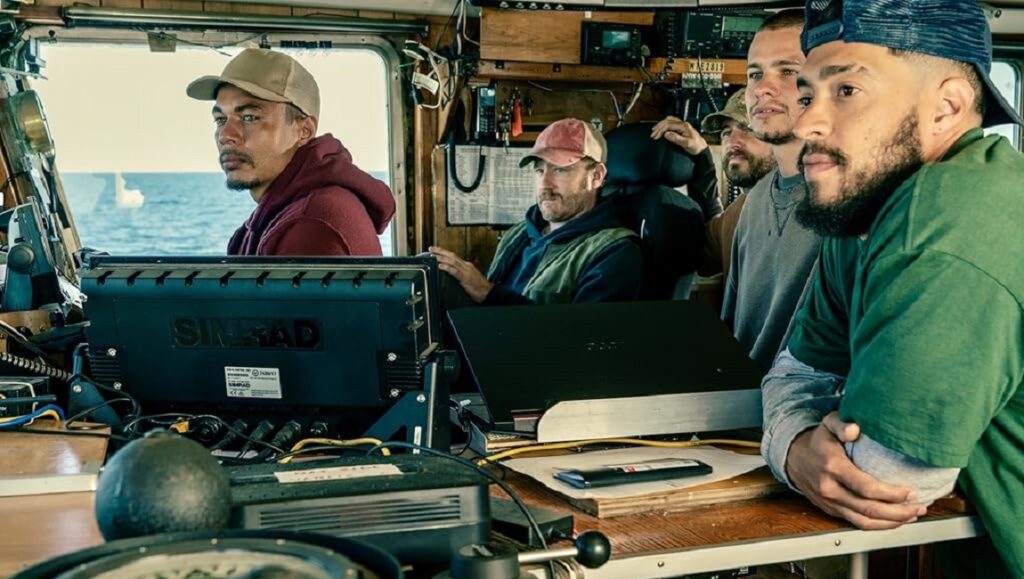Brian Helgeland’s Finestkind is an evasive conundrum, a hodgepodge of augmented dramaturgy that very poorly traverses what should be electric genre terrain. Its general plot description reads: “two brothers [are being] pulled into a deal with an organized crime syndicate in Boston.” Yet, this doesn’t happen until about two-thirds of the way through, the preceding narrative split between a family drama and a crime caper set in illegal Canadian waters. Helgeland seems to have had three distinct concepts for “films which surround fishing,” and indiscriminately figured it would be best to see just how well the three might mesh. Of course, this is assumptive, but the general air of confusion and inconsistency the film evinces across its runtime suggests internal strife. It’s an overwritten and illogical work that has no ideas to offer beyond the immediacy of conserving the importance of familial ties, and its uneven, saccharine beats puncture its most hyper-extended sequences in what plays out as a post-production process gone horribly wrong. There is such an intense lack of affective continuity, and a persistently breakneck rearrangement of its tone, that Finestkind becomes impossible to take seriously in even its depiction of the most mundane human interactions. Each character is a melange of melodramatic archetypes: the lowly and forlorn estranged father; the gruff, tough, and emotionally isolated son; the wet-behind-the-ears but ignorantly self-assured younger half-brother; the quick-on-her-feet and independent girlfriend. And these core characters exist alongside a cast of supporting actors who exemplify the moment, each of whose personality shifts depending on the aesthetic demands of the scene. They aren’t characters so much as they are set dressing; devices to ramp up the stakes if necessary or to provide exposition dumps when needed.
But in truth, the film speaks provides the most damning evidence as to its own structural failures. That’s not to say it’s an offensive project on any level beyond its base construct, but rather that there is a clear crisis of identity and intention at work. Rather than detail the myriad ways, let’s look, for example, at this slightly editorialized excerpt pulled from one dialogue between Jenna Ortega and Toby Wallace’s lovers, Mabel and Charlie, who met for the first time only the day prior to this interaction. Mabel states desperately, “You need to know some shit about me, Charlie. Alright, I’m interested in stuff. I’m interested in myself! You know, I’m a brave person. Alright, I look after me cause I’m the only one that’s doing that. Alright, and you know what I want? I want to give myself a shot. Alright? I want to make the most out of myself, and of my life, and I’m not sure how I’m gonna do it, but I know that I can. Does that make sense to you?” Charlie responds assuredly, “Yeah, you wanna be your own hero.” Mabel looks on with acute realization that Charlie understands. Tears well up and her throat briefly closes. “This is just where I’m from, alright? It’s not where I’m going.” she says softly. Charlie nods, “Okay. So let’s go.” She smiles.
This type of characterization, one made immediately legible based on abstracted declarations of the self, which are never developed or proven elsewhere in the film, offers a prime showcase of the failures present in Finestkind. Dynamics are forcefully devised as to organize the machinations of plot and emotional logic, though there’s not a single attempt to give that logic the space it needs to develop within the narrative. And these are, yes, dramaturgical faculties of melodrama, but this melodrama is fragmented and strained in its desire to fit within Helgeland’s collective of interpersonal relationships that offer no recourse through the film’s convoluted plotted. The father/son dynamic is all that is provided space within Finestkind‘s present discursive genre elements, marginalizing what the film established as its central human subjects: brotherly love, aspirational self-reliance, autonomy. While the denouement comes around to neatly explicate how these themes do in fact find their closure, it’s only through transparent contrivance that they even return to the fore. Hence, it seems entirely unlikely that this isn’t a project existing in utter abundance outside of the final product we have been delivered. How much was left on the cutting room floor? How much was clumsily cleaved from the pages of its script? It feels like there could reasonably be another two hours of dramatic context that is entirely absent. But whatever case, Finestkind, in this form, can be chalked up to a merely amusing and alienated debacle, obtuse to its own shortcomings.
DIRECTOR: Brian Helgeland; CAST: Jenny Ortega, Tommy Lee Jones, Ben Foster, Toby Wallace; DISTRIBUTOR: Parmaount+; STREAMING: December 15; RUNTIME: 2 hr. 6 min.


Comments are closed.